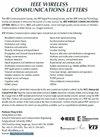面向多自动驾驶辅助边缘计算的个性化联邦强化学习
IF 5.5
3区 计算机科学
Q1 COMPUTER SCIENCE, INFORMATION SYSTEMS
引用次数: 0
摘要
在这封信中,我们提出了一种创新的自主飞行器(AAV)辅助计算卸载方案,其中多个具有异构计算能力的AAV协作为移动用户(mu)提供任务卸载服务。我们的目标是通过联合优化自动驾驶汽车的服务位置、速度、用户关联和卸载策略,使自动驾驶汽车的最大任务处理延迟和平均能耗的加权和最小。我们将这一问题建模为一个完全分散的部分可观察马尔可夫决策过程(Dec-POMDP),并提出了一种个性化的联邦强化学习(FRL)算法,称为基于联邦知识蒸馏的参数化深度q -网络(FKD-PDQN),以分散和经济高效的方式协同优化aav的策略。在该方法中,每个AAV使用PDQN优化其本地策略,并通过关注机制通过聚合来自相邻AAV的提炼知识来更新其模型。仿真结果表明,该算法有效地降低了平均延迟、能耗和通信开销,与独立PDQN (IPDQN)、联邦PDQN (FPDQN)和Krum等基线算法相比有显著改进。本文章由计算机程序翻译,如有差异,请以英文原文为准。
Personalized Federated Reinforcement Learning for Multi-AAV Assisted Edge Computing
In this letter, we propose an innovative autonomous aerial vehicle (AAV)-assisted computation offloading scheme, where multiple AAVs with heterogeneous computational capabilities collaborate to provide task offloading services for mobile users (MUs). Our objective is to minimize the weighted sum of the MUs’ maximum task processing delay and the AAVs’ average energy consumption by jointly optimizing the AAVs’ service locations, velocities, user association and offloading policies. We model this problem as a fully decentralized partially observable Markov decision process (Dec-POMDP) and propose a personalized federated reinforcement learning (FRL) algorithm, named federated knowledge distillation based parameterized deep Q-network (FKD-PDQN), to collaboratively optimize the AAVs’ policies in a decentralized and cost-efficient manner. In this approach, each AAV optimizes its local policy using PDQN, and updates its model by aggregating the distilled knowledge from the neighboring AAVs through an attention mechanism. Simulation results reveal that the proposed algorithm effectively reduces the average delay, energy consumption, and communication overhead, offering significant improvements over baseline algorithms such as Independent PDQN (IPDQN), Federated PDQN (FPDQN), and Krum.
求助全文
通过发布文献求助,成功后即可免费获取论文全文。
去求助
来源期刊

IEEE Wireless Communications Letters
Engineering-Electrical and Electronic Engineering
CiteScore
12.30
自引率
6.30%
发文量
481
期刊介绍:
IEEE Wireless Communications Letters publishes short papers in a rapid publication cycle on advances in the state-of-the-art of wireless communications. Both theoretical contributions (including new techniques, concepts, and analyses) and practical contributions (including system experiments and prototypes, and new applications) are encouraged. This journal focuses on the physical layer and the link layer of wireless communication systems.
 求助内容:
求助内容: 应助结果提醒方式:
应助结果提醒方式:


